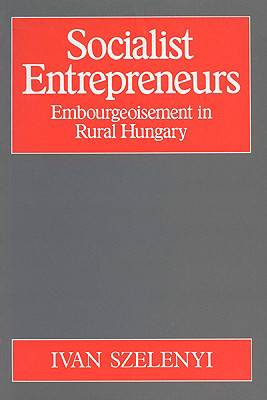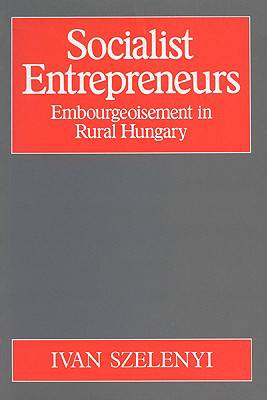
- Afhalen na 1 uur in een winkel met voorraad
- Gratis thuislevering in België
- Ruim aanbod met 7 miljoen producten
- Afhalen na 1 uur in een winkel met voorraad
- Gratis thuislevering in België
- Ruim aanbod met 7 miljoen producten
Omschrijving
Among the East European nations, Hungary has been noted in recent years for permitting, even encouraging, family entrepreneurship in agriculture. In this highly empirical study, Ivan Szelenyi and his collaborators explore this phenomenon, affording a rare view of the reemergence of private sector activity in a socialist society, and offering new insights into the very origins of capitalism.
In the years since the government relaxed its policy of forced collectivization, approximately ten percent of rural Hungarian families have taken up entrepreneurial opportunities in agriculture. Why they have chosen this course--and why ninety percent of family have chosen to remain in proletarian or cadre positions--are central questions in Szelenyi's inquiry.
The theory advocated here is one of "interrupted embourgeoisement." Those people who, during the years of Stalinism, found occupations in which they could successfully resist the dual pressures of proletarianization and cadrefication are the ones now able to reenter the interrupted embourgeoisement trajectory. As a result, the communist "revolution from above" has been challenged by a somewhat unexpected "revolution from below," in the process producing a socialist mixed economic system that seems to be as different from Soviet--style communism as it is from Western capitalism.
Specificaties
Betrokkenen
- Auteur(s):
- Uitgeverij:
Inhoud
- Aantal bladzijden:
- 320
- Taal:
- Engels
Eigenschappen
- Productcode (EAN):
- 9780299113643
- Verschijningsdatum:
- 27/07/2006
- Uitvoering:
- Paperback
- Formaat:
- Trade paperback (VS)
- Afmetingen:
- 152 mm x 229 mm
- Gewicht:
- 367 g

Alleen bij Standaard Boekhandel
Beoordelingen
We publiceren alleen reviews die voldoen aan de voorwaarden voor reviews. Bekijk onze voorwaarden voor reviews.












